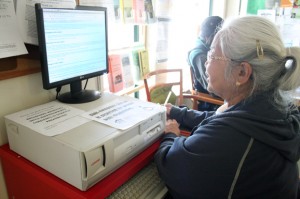My placement at Mount Pleasant Neighbourhood House (MPNH) is in two basic computer skills classes. The first class teaches basic computer skills to newcomer women who have immigrated to Canada within the past five years. The other class also teaches basic computer skills, and is part of the neighbourhood house’s community literacy program. Although this class is open to anyone who wishes to join, all the participants are women, mostly seniors. In both classes, all the women (with the exception of one) have English as a second language with minimal English literacy and fluency.
Given that all the class participants are women, I have attempted to approach my fieldwork from a feminist perspective, as discussed in Dorothy Smith’s chapter on feminist methodology. In her work, Smith speaks about “how we might proceed in exploring the everyday world from the standpoint of women” (Smith, 1988). In my research, I am trying to connect more macro-level themes around migration, technological capital, and gender to the micro-level, personal stories and lived experiences of these women. As I do research, it is important for me to be conscious of my own role as a researcher, to acknowledge my own positionality (i.e. my worldview, experiences, biases, privileges, etc), and to be careful not to make broad assumptions about these women’s lives. The women I am working with are diverse, not homogenous, as are their experiences. They are mothers, grandmothers, newcomers, speakers of many languages, and have varying levels of education and class backgrounds. These women carry unique perspectives from countries around the globe such as Mexico, China, Japan, India, Korea, and the Philippines.
I am beginning to understand how challenging it is to learn to use a computer as an adult, particularly in a new language. While I don’t consider myself to be a tech genius, I am fully computer literate. For instance, I can use Mac or PC operating systems without difficulty, I can touch type quickly, I can navigate web-based social media, and I can effortlessly search for information online. In addition, I have ready access to a computer when I need it, either at home, at school, or at a friend’s place. While I use computers daily and with ease, this is not the case for the women and seniors with English as a second language I have encountered at MPNH.
This has made me think about the connections between gender and technology, specifically about women and computer literacy. Why is it that only women are in these classes, and not men? What does this say about the opportunities women have to learn computer skills and access technology? Are there no male participants in these classes because many of them are working during the day? Or is it perhaps because men already possess greater computer skills than their female counterparts?
Participating in these computer classes has made me more aware of the value of computer literacy and accessibility. For these women, computer literacy means greater access to information and communication – being able to communicate with friends and family who live far away, to access information about services and job opportunities, to write a resume, and to practice English. Thus, the ability to use computers is a kind of social capital, a valuable skill for work and life, and one that the women in these computer classes hope to gain.

